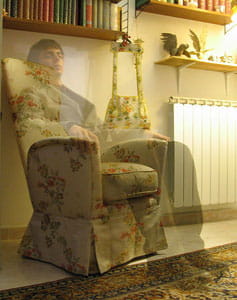This article is part of the Wicca Series on the Pagan Portal at Patheos.
 Imagine you are talking to the ghost of a Wiccan:
Imagine you are talking to the ghost of a Wiccan:
I am an invisible Wiccan. I am in the "broom closet." My family doesn't know of my faith. My co-workers don't know of my faith. Most of my friends don't know of my faith. There aren't any covens in my area. I communicate to other Wiccans through the internet, using a pseudonym, and through small festivals, also using a pseudonym. My daughter doesn't know of my faith. My ex-husband is a conservative Christian and we had an unpleasant divorce and custody battle. My altar looks decorative to the untrained eye. My Book of Shadows is in a folder on my hard drive labeled "Recipes." My few Wiccan books are tucked away on the bottom shelf of my large bookcase behind a chair.
I meditate every day. I celebrate every Full Moon in the privacy of my bedroom. I use my personal days at work for the Sabbats that don't fall on a weekend. I spend those Sabbats visiting the metaphysical shop in the nearest city, cooking a special meal and privately meditating. My religion is central to my life, but secret. I cannot lose the ability to spend time with my daughter. I cannot lose my job. I cannot bear to lose my family. I attend church with my family for special holidays. I take my daughter to church when she stays with me. Sometimes I attend church with friends when I miss the feeling of group worship.
When I die unexpectedly, my computer's hard drive will be wiped and loaded with educational games for my daughter. My large collection of books will be given to Goodwill. My sisters and mother will take the "pretty knick-knacks" from my altar to remember me by. No one will notify the Wiccan friends I've made online or at festivals who only know me by my pseudonym. At my funeral I will be hailed as a "sometimes Sunday" Christian with bohemian and "granola" tendencies. A cross will be placed on my grave. No one will remember me as a Wiccan. There will be no surviving evidence of my religion. Though my heart lived for the God and the Goddess, it lives no more. If I, as a Wiccan in the 1990's, can be forgotten and my life whitewashed as that of a "good Christian," if I am uncounted and unremarked in the annals of Wiccan history though I lived such a short time ago, how are we to know the hearts of those who lived a few hundred years ago?
The above scenario is a pretty reasonable one. It may have actually happened. Sometimes, even when loved ones know your religion, they still tend to gloss over the facts of your life they disagreed with after your death. How many gay men and women died while still "in the closet"? Lady Sintana, founder of Ravenwood tradition and Wiccan activist, died in the care of her Christian family and far from her religious community.
Imagine you are a scholar looking at the life of our "invisible Wiccan." What evidence survives of her faith? Tools? Books? Statements of faith? Statements from friends and acquaintances?
Perhaps a few people say she looks like a woman called Juniper that used to come to festivals. Perhaps she did have a collection of mythological statuettes. Maybe her daughter remembers her burning incense and not allowing her to play with her "pretty knick-knacks." She certainly bought a lot of incense at the metaphysical shop in the city, but then buying incense doesn't make one Wiccan. There is plenty of evidence that she did attend church, encouraged her daughter to attend church, and she was given a Christian funeral. Case closed.
Now as the Wiccan community examines her life, what might they say? She wasn't courageous enough to risk losing her job and child? She didn't participate in the Wiccan community enough to be a proper Wiccan? She wasn't initiated by a proper Witch and trained in a proper Wiccan coven? She had a few books and might have dabbled but she wasn't really a Wiccan?
We often dismiss the old tales as modern invention, but does it sound so silly to have someone designated to destroy your books and tools upon your death, when today people make the same pacts to have their pornography destroyed when they die? Can anyone who's studied the GLBT community say that it's impossible for someone to keep a vital part of themselves so secret that no one knows about it even after they die?
It is my opinion that this is what makes studying Wicca's history and origins an almost impossible task. The witch-trials of Europe only give us testimony that is both the result of torture and interpreted through the eyes of Christian authorities. The practices of Paganism are seen as folkways and irreligious in and of themselves. The few confessions of faith in something non-Christian are subject to many interpretations. The argument that people did not understand the implications or roots of what they practice at times is presented so aggressively as to make the Europeans of yore sound like clueless imbeciles.





